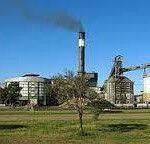 Pakistan is an agrarian country and one fourth of country’s GDP is contributed by agriculture. Nearly two third of the workforce is also deployed in agriculture. The country produces wheat, rice, sugarcane and cotton. Two of the large-scale industries draw their basic raw material, cotton and sugarcane, from farms. While textiles and clothing units help in earning two-third of total export proceeds, sugar mills are the driving engine of rural economy.
Pakistan is an agrarian country and one fourth of country’s GDP is contributed by agriculture. Nearly two third of the workforce is also deployed in agriculture. The country produces wheat, rice, sugarcane and cotton. Two of the large-scale industries draw their basic raw material, cotton and sugarcane, from farms. While textiles and clothing units help in earning two-third of total export proceeds, sugar mills are the driving engine of rural economy.
Pakistan is among the top sugarcane producing countries and also has installed capacity to produce 9 million tons of refined sugar. The average annual production of refined sugar has surpassed 5 million tons as against local consumption of around 4 million tons. Capacity utilization of mills has remained below optimum due to bad sugar export policy. In the past country had faced shortage of sugar which makes the incumbent governments over-cautious when it comes to allowing export of the commodity.
Crushing of sugarcane is a seasonal activity and length of crushing period is dependent on availability of sugarcane. Over the years installed crushing capacity has increased that has shrunk duration of the season that is often less than 150 days. As against this, consumption of sugar is spread throughout the year with enhanced sales during the holy month of Ramadan. Mills are located in three provinces, except Baluchistan and distribution channel comprises of mills, wholesalers and retailers.
Historically, sugar trade has remained ‘mill specific’ due to the preference of buyers. While all the mills are required to follow uniform quality standards, some of the units take extra measures. The value of 5 million tons comes to Rs200 billion (based on ex-mill price of Rs40,000/ton) that requires ample liquidity and efficient storage and trading mechanism to protect the interest of all the stakeholders i.e. sugarcane growers, mills, wholesalers, retailers and above all consumers.
The need has been felt to make the existing system more efficient. It is believed if sugar trading is done on a technology driven platform some of the existing inefficiencies can be removed. In Pakistan a commodity exchange is working named Pakistan Mercantile Exchange (PMEX). Experts believe PMEX is capable of offering trading platform for cash settled as well as deliverable contracts. It is believed that offering of both types of contracts at one platform will help in hedging the risk more efficiently that will be beneficial for all the stakeholders.
To achieve this target two of the apex regulators, State Bank of Pakistan and Securities & Exchange Commission of Pakistan, millers and traders needs to sit down together to finalize details of sugar contracts (both cash settled and deliverable) to minimizing speculation and developing an efficient and transparent sugar trading system. The added advantage is that the trading system will become fully documented to enable the financial institutions to extend credit to sugar distribution chain that will facilitate the mills in making timely payments to sugarcane growers.